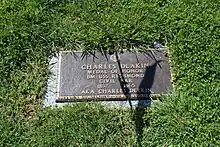Charles Deakin | |
|---|---|
 Charles Deakin Memorial Marker at Rosedale Cemetery | |
| Born | 1837 New York City, US |
| Died | October 4, 1865 Philadelphia, Pennsylvania, US |
| Place of burial | Lafayette Cemetery, Philadelphia, Pennsylvania Rosedale Memorial Park Cemetery, Bensalem, Pennsylvania |
| Allegiance | United States Union |
| Service/ | US Army Union Navy |
| Rank | Boatswain's Mate |
| Unit | USS Richmond |
| Battles/wars | American Civil War • Battle of Forts Jackson and St. Philip • Battle of Mobile Bay |
| Awards | Medal of Honor |
Charles Deakin (1837 - d. October 4, 1865), born Charles Deykin, was a Union Navy sailor in the American Civil War and a recipient of the U.S. military's highest decoration, the Medal of Honor, for his actions at the Battle of Mobile Bay.
Military service
Born in 1837 in New York City, Deakin was living in Philadelphia when he joined the Navy. He served during the Civil War as a boatswain's mate and gun captain on the USS Richmond.[1] In April 1862, he took part in the Battle of Forts Jackson and St. Philip in Louisiana. At the Battle of Mobile Bay on August 5, 1864, he "fought his gun with skill and courage" despite heavy fire. For this action, he was awarded the Medal of Honor four months later, on December 31, 1864.[2][3]
Medal of Honor citation
Rank and organization: Boatswain's Mate, U.S. Navy. Accredited to: Pennsylvania. G.O. No.: 45, 31 December 1864.
Deakin's official Medal of Honor citation reads:
As captain of a gun on board the U.S.S. Richmond during action against rebel forts and gunboats and with the ram Tennessee in Mobile Bay, 5 August 1864. Despite damage to his ship and the loss of several men on board as enemy fire raked her decks, Deakin fought his gun with skill and courage throughout a furious 2-hour battle which resulted in the surrender of the rebel ram Tennessee and in the damaging and destruction of batteries at Fort Morgan. He also participated in the actions at Forts Jackson and St. Philip.[3]
Death and burial
Medal of Honor recipient Charles Deakin died October 4, 1865, from a hemorrhage of the lungs. He died at the residence of Margaret Densmore, who was the widow of Medal of Honor recipient Chief Boatswain's Mate William Densmore. Deakin was buried October 6, 1865, at the now defunct Lafayette Cemetery in Philadelphia. In 1947, the interments of Lafayette Cemetery were removed to Evergreen Memorial Park in Bensalem, Pennsylvania.[4] Evergreen Memorial Park went out of business and became part of Rosedale Cemetery in 1960.[5]
Deakin's death notice in the October 6, 1865 Philadelphia Inquirer newspaper read:
DEYKIN - On the 4th instant, CHAS. DEYKIN, late Boatswain's Mate of the United States sloop-of-war Richmond, in the 33rd year of his age. The relatives, friends and shipmates are respectfully invited to attend his funeral, from the residence of Mrs. Margaret Densmore, No. 755 Swanson street, this (Friday) afternoon, at 4 o'clock.
References
- ↑ Wiggins, Kennard R. Jr. (2019). America's Anchor: A Naval History of the Delaware River and Bay, Cradle of the United States Navy. Jefferson, North Carolina: McFarland & Company, Inc. p. 227. ISBN 978-1-4766-7197-0. Retrieved 2 May 2021.
- ↑ "Charles Deakin". Hall of Valor. Military Times. Retrieved September 26, 2012.
- 1 2 "Civil War Medal of Honor Recipients (A–L)". Medal of Honor Citations. United States Army Center of Military History. June 26, 2011. Archived from the original on September 2, 2012. Retrieved September 26, 2012.
- ↑ Keels, Thomas H. (2010). Wicked Philadelphia: Sin in the City of Brotherly Love. Charleston, SC: The History Press. ISBN 978-1-61423-105-9. Retrieved 28 April 2021.
- ↑ "Monument planned for unmarked graves". The Philadelphia Inquirer. March 16, 1989. Retrieved 3 May 2021 – via Newspapers.com.